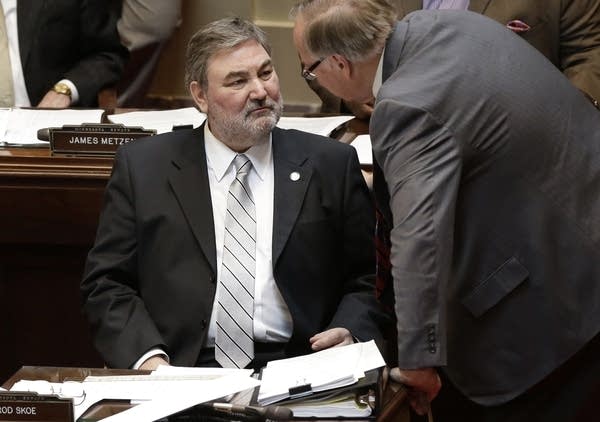DFL lawmakers hint that some sales tax increases may go away
Go Deeper.
Create an account or log in to save stories.
Like this?
Thanks for liking this story! We have added it to a list of your favorite stories.

Some Minnesota businesses affected by a new sales tax expansion are complaining loudly about the recently passed law, and they want to see parts of it repealed next year.
The pending sales tax on warehousing services is a big concern at Distribution Alternatives in Lino Lakes, a 75-year-old company with 150 employees. It would require customers to pay the state sales tax of 6.875 percent.
Under the tax, Minnesota warehouses will face a significant competitive disadvantage when their customers are required to pay a tax that they aren't paying now, said Dave Smith, the company's vice president. He hopes the Legislature reverses course on the tax, and the Democrats in charge of the House and Senate tax committees say that could happen.
But Smith said his company isn't waiting for the Legislature to act.
Turn Up Your Support
MPR News helps you turn down the noise and build shared understanding. Turn up your support for this public resource and keep trusted journalism accessible to all.
"We've actually begun the process of looking for facilities in other states," Smith said. "We've actually worked with a real estate agent already. We gave him the list of four or five states to look at."
"I am not interested in raising any taxes at all for anything."
Republican lawmakers have been echoing those concerns. House Minority Leader Kurt Daudt said he thinks Democrats, who have a majority in the chamber, made a big mistake in the closing hours of the legislative session.
"I think it's pretty easy to see that this will increase costs for the products and goods and services that everyday Minnesotans buy all the time," said Daudt, R-Crown. "And frankly I think it doesn't take a lot of common sense to figure out this is ultimately going to be bad for Minnesota's economy."
The sales tax change for warehousing doesn't kick in until April 2014. That gives lawmakers time to reconsider the issue if they choose. They could also revisit other sales tax changes that begin sooner, such as new taxes on repairs of commercial equipment.
But Senate Tax Chair Rod Skoe isn't making any promises.
"We'll see what gets introduced," said Skoe, DFL-Clearbrook. "I have no plans to introduce bills dealing with either of the issues, either warehousing or sales tax components of the tax bill. We'll see what other legislators do."
Expanding the sales tax was a major point of contention this year among Democrats. Gov. Mark Dayton, a Democrat, originally proposed a broad expansion but later dropped it.

Senate DFL leaders later revived a few specific pieces, which they used to provide a sales tax exemption for purchases by local governments. House DFL leaders never advocated for an expansion, but they ultimately went along with the Senate.
House Tax Chair Ann Lenczewski said she is willing to revisit the sales tax changes next session. But she wants the Senate to figure out how to plug the roughly $300 million revenue hole that would result from a repeal.
"I am not interested in raising any taxes at all for anything," said Lenczewski, DFL-Bloomington. "We did that this past session. Next year, we should be good. So, people can cut. You don't have to just raise taxes to fix those things. People can cut some things."
The labor costs for business-related equipment repairs, including electronics and machinery, will be subject to the sales tax for the first time beginning July 1.
Rural lawmakers have raised concerns about the inclusion of farm equipment. Some have called for a farm equipment exemption. Lenczewski, however, does not agree with that approach.
"If there are 20 kinds of companies affected by one provision, to say that the Legislature should help one kind of company and leave the other 19 still having to have that new tax, that wouldn't be fair, to me," she said. "So the provisions have to be addressed in totality."
Minnesota Revenue Commissioner Myron Frans said he plans to keep a close eye on the farm equipment repairs tax, and the concerns that it has been raising. Frans said Dayton and Skoe asked him to track the issue and report back to them early next year.
"There's really no preconception about what we might say or recommend," Frans said. "They really wanted me to go out and do some fact gathering and monitor this situation and see what kind of effect it had on agricultural economy, and then they really wanted me to come back and make some recommendations."
So far, Frans said his department is focusing on the sales tax changes that take effect next month. He said the department will offer additional guidance on next year's warehousing tax later in the summer.
Dear reader,
Your voice matters. And we want to hear it.
Will you help shape the future of Minnesota Public Radio by taking our short Listener Survey?
It only takes a few minutes, and your input helps us serve you better—whether it’s news, culture, or the conversations that matter most to Minnesotans.





